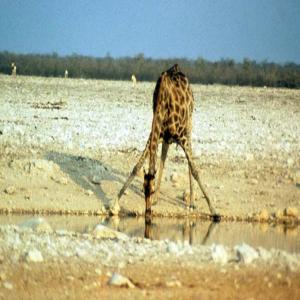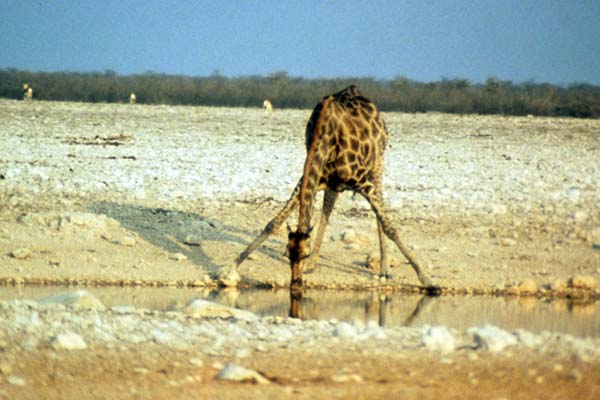Episodes

Monday Sep 05, 2011
The WildLife: New Frog Species Discovery in Ecuador, Alejandro Arteaga
Monday Sep 05, 2011
Monday Sep 05, 2011
Alejandro Arteaga, a 19-year-old university student, talks about his discovery of a new frog species living in Ecuador’s Andean highlands, the Bamboo Rain-Peeper (Pristimantis bambu). He tells “The WildLife” host Laurel Neme how he and his colleagues traipsed through the forest late at night searching for tiny creatures with the aid of headlamps. The result was many seemingly identical little, brown frogs. At first, Alejandro grouped them as the same species, Mountaineer Rain-Peepers (Pristimantis orestes). However, after much hard work and observation, he uncovered differences in their songs and ecological preferences. He soon came to realize that those frogs that had a different song also were restricted to patches of bamboo forest, while the other seemingly identical frogs lived in old-growth montane forests and paramos. Neither habitats, nor songs overlapped. Discovering a species new to science is not an easy task but as, Alejandro notes, in the right place, with the right info, and with the right assistance, the task becomes much easier, and even fun.
Alejandro Arteaga is an experienced and talented 19 year-old student from Venezuela studying biology at the Pontificia Universidad Católica del Ecuador. He’s also the founder Tropical Herping, a novel initiative striving to discover, document and preserve tropical reptiles and amphibians through sustainable tourism, scientific research and effective environmental education. This episode of “The WildLife” was posted on September 5, 2011.
The WildLife is a show that explores the mysteries of the animal world through interviews with scientists, authors and other wildlife investigators. It airs every Monday from 1-2 pm EST on The Radiator, WOMM-LP, 105.9 FM in Burlington, Vermont.

Monday Mar 14, 2011
The WildLife: The Dark Side of New Species Discovery, Bryan Stuart
Monday Mar 14, 2011
Monday Mar 14, 2011
Bryan Stuart, curator of amphibians and reptiles at the North Carolina Museum of Natural Sciences, talks about the dark side of the discovery of new species. He tells “The WildLife” host Laurel Neme about his experience following his scientific discovery in Laos of a warty salamander (Paramesotriton laoensis) with striking markings. Shortly after describing the previously unknown species in a scientific paper published in 2002, commercial dealers began collecting the salamanders for sale into the pet trade. Particularly galling to Bryan was the fact that they used his geographic description as a roadmap to find the rare newt. This situation is not unique. It’s also happened with a turtle (Chelodina mccordi) from the small Indonesian island of Roti, which so heavily hunted that today it is nearly extinct in the wild. Similarly, a rare gecko (Goniurosaurus luii) from southeastern China was extirpated from its locality as prices in importing countries soared to highs of $1,500 to $2,000 each. It’s a dual dilemma. On the one hand, publishing new species descriptions may inadvertently facilitate their extinctions for commercially valuable species, yet on the other, the conservation benefits of describing the new species can outweigh this potential risk. Bryan recommends that taxonomists work closely with relevant governmental agencies to coordinate publication of the description with legislation or management plans that thwart overexploitation of the new species. In fact, Bryan and his students have worked tirelessly in this regard and, in August 2008, Laos’ Department of Forestry protected this salamander from commercial trade. Now the remaining question is enforcement. Note: Laurel first met Bryan while researching a wildlife trafficking case for ABC News Nightline that involved the illegal import of hundreds of these rare salamanders that were dried and destined for traditional medicine.
Bryan Stuart is curator of amphibians and reptiles at the North Carolina Museum of Natural Sciences. He received his Bachelor of Science (B.Sc.) in biology from Cornell University, a Master of Science (M.Sc.) in zoology from North Carolina State University, and a Ph.D. in biology from the University of Illinois. He also held a post-doctoral appointment at the Museum of Vertebrate Zoology at the University of California, Berkeley, before returning to Raleigh to join the North Carolina Museum of Natural Sciences in September 2008. His research interests are in the biodiversity, systematics, biogeography and conservation of amphibians and reptiles. Much of his research has focused on amphibians and reptiles of the Old World tropics, especially Southeast Asia, where he has maintained an active field program for the past decade. He has particular interest in using molecular tools to define species boundaries and unravel their evolutionary histories. This episode of “The WildLife” aired on The Radiator, WOMM-LP, 105.9 FM in Burlington, Vermont on March 14, 2011.

Monday Feb 08, 2010
The Wildlife: Amphibian Trade, Alejandra Goyenechea
Monday Feb 08, 2010
Monday Feb 08, 2010
Alejandra Goyenechea, international lawyer, discusses the global amphibian trade and its impact on rare and threatened species. She tells “The WildLife” host Laurel Neme about the benefits of frogs and the many threats – such as habitat loss, climate change, pollution, disease, and overexploitation – to their survival. Did you know frogs indicate environmental quality, like canaries in a coal mine? Or that many have medicinal properties, like the phantasmal poison dart frog which produces a painkiller 200 times the potency of morphine? A booming international trade exists that uses frogs for food, pets, medicine and scientific purposes – a trade that is now jeopardizing the continued existence of many species. Ms. Goyenechea is International Counsel at the International Conservation Program of Defenders of Wildlife and also Chair of the Species Survival Network’s (SSN) Amphibian Working Group. Her primary focus is the Convention on International Trade in Endangered Species (CITES) and other international trade law issues, with an emphasis on Latin America. She has worked at several international institutions and organizations and has experience in wildlife policy and broader experience in other environmental areas. During her work with the Mexican government she represented the Environmental Enforcement Agency at the international level. She also has interned or worked at the Organization of American States, the United Nations Environment Program (UNEP) North American office, and the DC law firm Baker Botts. Alejandra earned her law degree at the Instituto Tecnológico Autónomo de México, in Mexico, and came in 2000 to Washington DC to complete a Masters degree, LLM, in International Environmental Law, at the Washington College of Law at American University, with a Fulbright scholarship. She speaks fluent English, Spanish and French. This episode of “The WildLife” aired on The Radiator, WOMM-LP, 105.9 FM in Burlington, Vermont on February 8, 2010.

